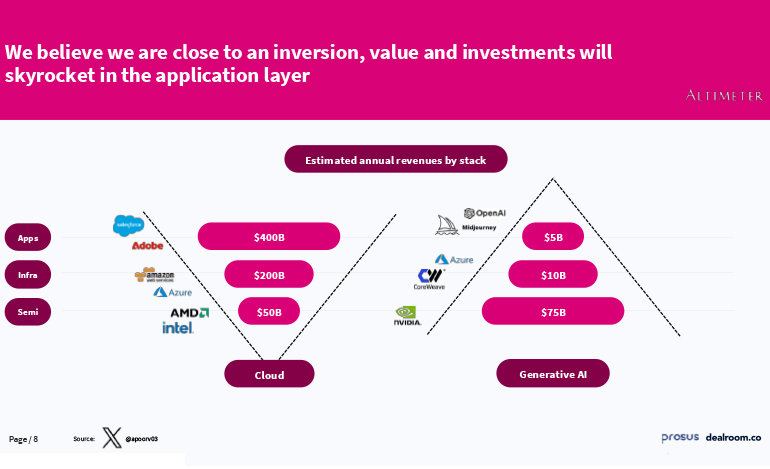In 2024, AI captured over $110 billion in global venture funding—a 62% year-over-year increase. It now accounts for nearly one-third of all VC funding globally, and in the U.S., it’s approaching the 50% mark.
As investment shifts toward scalable, revenue-generating solutions, the spotlight is moving from foundational models to the application layer. That’s where AI moves from infrastructure to impact—and where Prosus sees the greatest opportunity ahead.

Source: Dealroom.co
Why the application layer is taking the lead
In recent years, foundational models—large-scale AI systems trained on massive datasets and capable of powering a wide range of downstream tasks (for example, generating content, powering chatbots, or analysing customer sentiment)—have captured the lion’s share of capital funding. These include models like GPT, Claude, and open-source equivalents, which serve as the core infrastructure behind many AI tools and services. Their ability to generalise across use cases, generate human-like text, process images, and even reason through complex tasks made them a breakthrough innovation—and understandably, a focal point for early investment.
While foundational models have been successful, the largest profit pools are expected to emerge from applications built on top of these models. We predict a near-term inversion where investments in the application layer will skyrocket as businesses prioritise practical solutions that directly impact consumer experiences and operational efficiencies. This includes purpose-built tools that sit on top of foundational models and deliver tangible impact—whether through personalised e-commerce, automated healthcare workflows, or intelligent enterprise software. Investment will increasingly favour application-layer startups that drive revenue, efficiency, and user engagement.
We’re already seeing this shift globally across our portfolio. Qeen.ai is transforming e-commerce with AI agents, while Taktile powers over 20 million automated decisions per day for leading financial institutions, helping them optimize credit and risk workflows with AI.
CHART: We believe we are close to an inversion, value and investments will skyrocket in the application layer

How we’re building AI ecosystems
At Prosus, we believe the future of AI lies not just in foundational models, but in the powerful ecosystems built around them.
That’s why we’ve strategically invested in investments across the world that are using AI across e-commerce, fintech, healthcare, and beyond. Within this, over the last year, we’re seeing two areas emerge with especially strong momentum and market opportunity: 1) AI-powered e-commerce and (2) AI-driven digital workforces.
CHART: Select portfolio companies across Prosus AI focus areas

Agentic e-commerce: A new era of intelligent retail
The e-commerce landscape is undergoing a massive transformation—driven not just by changing consumer behaviours, but by the accelerating impact of AI across every layer of the shopping experience. From discovery to checkout, AI is enabling unprecedented levels of personalisation, efficiency, and automation. Today’s consumers expect dynamic, tailored experiences that reflect their intent in real time—while businesses demand smarter tools that drive down costs and increase conversion.
Agent-based systems are emerging as the next leap forward in commerce. Our portfolio company Qeen.ai is pioneering this evolution by building e-commerce operating systems powered by autonomous AI agents—intelligent algorithms trained to solve problems with minimal intervention. The company is on a quest to create a future where technology simplifies and streamlines online commerce—where content, marketing, and conversion optimization become implicit, autonomous, and accessible to all.
Think of it like a personal concierge for every shopper: one who instantly understands your preferences and adapts the store layout, product recommendations, and offers just for you. These agents personalize each customer’s experience on the fly—adjusting product displays, promotions, and interfaces in real time. And the results are real: Qeen.ai has driven a 30% increase in add-to-cart rates for merchants, underscoring the commercial impact of intelligent personalization.
The shift extends beyond storefronts. Nexad is pioneering AI-native advertising by embedding personalised, context-aware ads directly into conversational interfaces like chatbots and AI agents. Its platform analyses user intent in real time and generates relevant ads that appear naturally within dialogue—creating a seamless, monetised experience.
This is more than incremental improvement—it’s a foundational shift in how digital commerce is built, operated, and optimised.
Digital workforce transformation: A new era of intelligent productivity
Beyond AI-powered commerce, Prosus is actively backing the reinvention of the digital workforce. This transformation centers on using AI to augment or replace traditional white-collar functions—unlocking greater efficiency, scalability, and cost savings for businesses.
This includes our portfolio company Ema, a universal AI employee platform built to function like a high-performing team member. Ema is reimagining enterprise software through AI employees—intelligent agents powered by Ema’s proprietary Generative Workflow Engine™. These dynamic agents reason over both structured and unstructured data, executing complex tasks autonomously and adapting to the context of each organization.
Rather than rigid workflows and static automation, Ema enables fluid, conversational experiences that simplify how work gets done. By embedding AI directly into daily operations, teams unlock new levels of speed, productivity, and scale—without the complexity of traditional systems. Ema’s vision is bold: to bring joy back to day-to-day work by making every team 10x more productive.
Our other investments reflect this broader thesis. For example, Corti specializes in AI foundation models for healthcare, built to reduce administrative burdens and enhance clinical reasoning. Learning from over 250,000 daily patient interactions, its models integrate seamlessly into healthcare applications via SDKs and APIs—enabling providers, payers, and vendors to deploy advanced AI across a wide range of use cases.
Looking ahead: Unlocking even more possibilities
As we look ahead, we’ll continue actively investing in companies aligned with our ecosystem thesis—and we’re excited to see this space evolve. We’re closely tracking a new wave of startups building at the application layer of AI. We’ve shared this list below.

Please also find more information about our investment strategies in our report “Shaping an AI-enabled Future: How Prosus is investing in the next wave of AI applications”.








